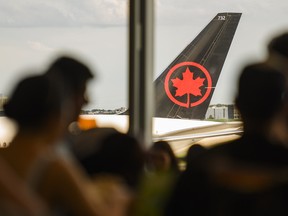CUPE is hopeful public support and legislative initiatives like Bill C-415 will drive meaningful change for flight attendants
Article content
Air Canada’s flight attendants have launched a PR offensive as they enter contract negotiations with the airline and tensions rise over long-standing issues related to pay, working conditions and scheduling. Wesley Lesosky, president of the Air Canada Component of the Canadian Union of Public Employees (CUPE), represents more than 10,000 members who have been working under the same collective agreement for a decade. With the current agreement set to expire on March 31, negotiations with Air Canada are now underway, and unpaid work is taking centre stage. Here are some of the key issues at play:
Advertisement 2
Article content
Article content
Article content
Unpaid work: a central issue in negotiations
One of the primary concerns raised by CUPE’s leadership, including Lesosky, is the issue of unpaid work. Flight attendants are currently compensated only for time spent in the air (known as in-flight credit hours), yet they perform critical tasks before and after flights. These include boarding passengers, assisting those with disabilities, conducting safety checks and managing luggage. The union estimates that flight attendants are working an average of 35 hours per month without compensation for these duties, which are mandated by Transport Canada. The anecdotal reason for the apparent pay discrepancy is an industry standard dating back to a time when flight attendants’ in-flight compensation was high enough to cover the surrounding duties.
Lesosky stated, “No other worker would be expected to show up for work and not get paid for it. This is a significant concern for our members.” To highlight the issue, CUPE has launched a public awareness campaign, including television advertisements and an interactive pop-up installation in Toronto, which features exaggerated portrayals of unpaid work and corporate policies. The goal of these efforts is to bring public attention to the issue of unpaid work and encourage support for their cause.
Article content
Advertisement 3
Article content
Stagnant wages and eroding purchasing power
In addition to the issue of unpaid work, CUPE has highlighted concerns about the stagnation of wages over the past decade, which has eroded purchasing power for flight attendants. Starting salaries at Air Canada are reported to be $27,000 annually, a figure that Lesosky deems insufficient for workers in a professional career.
The starting hourly wage of approximately $30 per hour, and the fact that flight attendants are only paid for time in-flight, leaves many, particularly junior attendants, earning less than minimum wage once unpaid duties are factored in. “It’s not uncommon for a flight attendant to work a 14-hour day but receive pay for just six to eight hours,” a CUPE representative said.
Lesosky notes that this has forced many workers to take on additional jobs to make ends meet, even as the airline continues to generate profits. “Inflation has eaten away at any semblance of livable wages. Our members are doing essential work, yet they are struggling financially,” Lesosky said. The union has called for enhancements in wages, benefits, and scheduling rules during the upcoming negotiations, although specific proposals have not been publicly disclosed.
Advertisement 4
Article content
Industry trends and legislative support
The issue of unpaid work is not unique to Air Canada but is a broader concern across the airline industry. In the United States, airlines such as Delta have introduced compensation for pre-flight duties, such as boarding, yet Canadian airlines have not followed suit. Lesosky questions why Canadian flight attendants are not afforded the same compensation for work performed on the ground. “Why is it that flight attendants are excluded from a minimum standard that applies to every other worker?” he said.
To further their cause, CUPE is also backing Bill C-415, a proposed federal law that seeks to standardize pay practices for flight attendants across Canada. Introduced by NDP MP Bonita Zarrillo in October 2024, the bill aims to ensure that flight attendants are paid for all mandated duties, including those carried out before and after flights. Lesosky, who has worked with the NDP on the bill, views it as a significant step toward addressing the nationwide issue of unpaid work in the airline industry “This legislation would ensure flight attendants are compensated for all their duties, bringing fairness to the industry,” he said.
Advertisement 5
Article content
Looking ahead: negotiations and potential labour action
Since negotiations with Air Canada began on December 11, CUPE has been focused on achieving a fair deal without resorting to a strike. Lesosky emphasized, “Our goal is to reach an agreement that satisfies our members and avoids disruption to passengers. But it’s important to note: enough is enough. Our members deserve to be paid fairly for the critical work they do.”
Recommended from Editorial
The union’s efforts to secure fair compensation for all hours worked may set a precedent for other airlines and contribute to ongoing discussions about worker rights in the industry. The union remains hopeful that public support and legislative initiatives like Bill C-415 will help bring attention to the issue and drive meaningful change.
• Email: shcampbell@postmedia.com
Bookmark our website and support our journalism: Don’t miss the business news you need to know — add financialpost.com to your bookmarks and sign up for our newsletters here.
Article content
Air Canada flight attendants could be poised to strike next
2025-01-07 15:00:47




